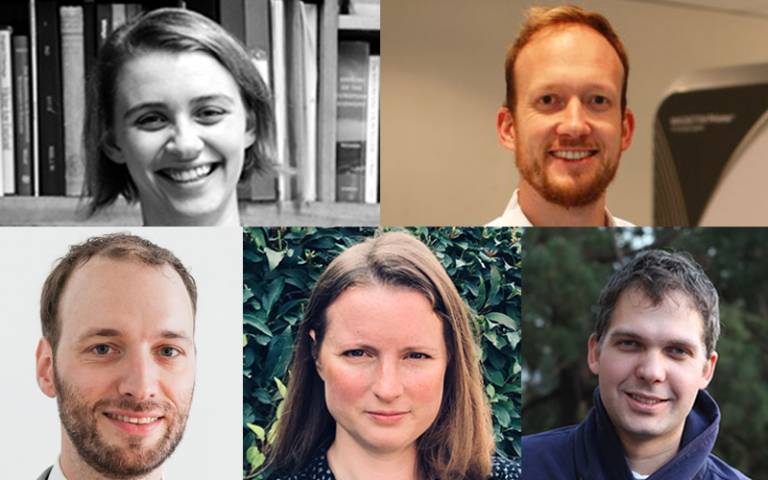Five UCL academics awarded ERC Starting Grants
7 September 2020
Five researchers from UCL have received prestigious EU funding for the next five years for projects in economics, archaeology and brain sciences

These five academics will join fellow laureates of the 2020 European Research Council (ERC) Starting Grants competition. The funding is worth in total €677 million, to assist early-career scientists and scholars conduct pioneering research across all disciplines. Of the allocated funds, €8.1million will be given to UCL projects.
The grants are part of the EU’s Research and Innovation programme, Horizon 2020.
The five recipients are:
- Dr Corisande Fenwick (UCL Archaeology) is Lecturer in Mediterranean Archaeology. Her project is entitled ‘Becoming Muslim: Cultural change, Everyday Life and State Formation in early Islamic North Africa (600-1000)’
- Dr Tobias Hauser (UCL Queen Square Institute of Neurology) is Principal Investigator at the Wellcome Centre for Human Neuroimaging. His project is entitled ‘Understanding the impact of brain fluctuations on decision making’
- Dr Peter Kok (UCL Queen Square Institute of Neurology) is Principal Research Fellow at the Wellcome Centre for Human Neuroimaging. His project is entitled ‘How our expectations can make us hallucinate: the neural mechanisms underlying perception’
- Dr Karoline Kuchenbaecker (UCL Psychiatry and UCL Genetics, Evolution & Environment) is an Associate Professor in genetic architecture of complex traits. Her project is entitled 'Depression in diverse populations: Unravelling the interplay between genes and environment'
- Dr Attila Lindner (UCL Economics) is Assistant Professor with a focus on labour economics, public finance, psychology and economics. His project is entitled ‘Minimum Wages, (mis)Allocation of Labour, and Inequality’
The award recipients come from 25 countries across Europe. From the 62 grants awarded to UK institutions, five have been given to UCL researchers. Other countries recognised include Germany, which will receive 88 grants, the Netherlands (42) and France (38).
Out of over 3,200 submitted proposals, 436 were selected for funding. The research initiatives chosen cover a range of topics in physical sciences, life sciences as well as social sciences and humanities.
Mariya Gabriel, European Commissioner for Innovation, Research, Culture, Education and Youth, said: “With European Research Council grants, the EU is leveraging the talent and curiosity of some of the best young researchers in Europe. Their ideas are set to break fresh ground and open new ways to deal with pressing challenges in the areas of health, energy and digital technologies, as well as many other fields. Our ambition to effectively tackle current and future crises depends on our strong will to continuously and increasingly support top research at the frontiers of our knowledge.”
President of the European Research Council (ERC), Professor Jean-Pierre Bourguignon, commented: “The present health crisis showed that despite spectacular progress in research over the past decades, there still remain plenty of unsolved scientific mysteries, as well as lessons to be learnt from the past. Therefore, the best strategy to tackle it is to enable some of the brightest minds to pursue their most innovative ideas, in order to create opportunities for serendipitous discoveries. This is what the European Research Council is for. It’s clear that, if Europe is to be competitive globally, it needs to give excellent prospects to the next generation of researchers as these ERC Starting Grants do, and to invest much more in top blue sky research.”
Further information
- Dr Corisande Fenwick’s academic profile
- Dr Tobias Hauser’s academic profile
- Dr Peter Kok’s academic profile
- Dr Karoline Kuchenbaecker’s academic profile
- Dr Attila Lindner’s academic profile
- UCL Division of Psychiatry
- UCL Department of Economics
- UCL Institute of Archaeology
- UCL Queen Square Institute of Neurology
- UCL Faculty of Social & Historical Sciences
- UCL Faculty of Brain Sciences
For the latest news about UCL’s international activity, partnerships and opportunities, subscribe to our bimonthly Global Update newsletter.
 Close
Close

